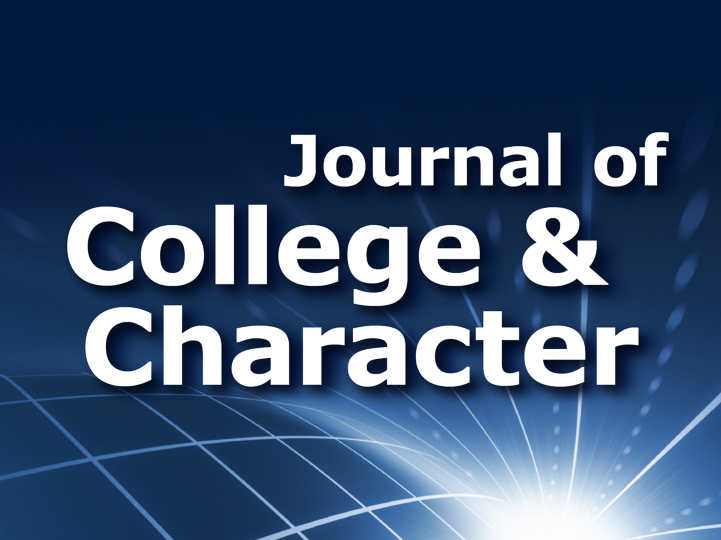
Three Questions Relating to Moral Development: JCC Feb. 2021
Civic Engagement Supporting the Profession Equity, Inclusion and Social Justice Civic Learning and Democratic Engagement Equity, Inclusion, and Social Justice Division Parent and Family Relations Spirituality and Religion in Higher Education Faculty
February 17, 2021
Here are some important questions that relate to moral development that are explored in articles in the February 2021 issue (vol. 22, no. 1) of the Journal of College and Character:
1. How can institutions foster interfaith literacy, dialogue, and interaction in the higher education setting?
Interfaith Learning and Development
Matthew J. Mayhew, The Ohio State University; Alyssa N. Rockenbach, North Carolina State University
Mayhew and Rockenbach adopted an interdisciplinary, equity-oriented framework intended to guide and inform interfaith practice. According to their research, development occurs through exposure to and participation in college experiences that help students achieve outcomes related to religious, spiritual, and worldview development. Read Mayhew's blog post interview. Read the open access article.
Students’ Attitudes Toward Interfaith Relationships: The Impact of Parents, Religiosity, and Christian Privilege
Meeta Mehrotram, Stephanie Zemba, and Kristi Hoffman Roanoke College
Mehrotram, Zemba, Hoffman asked students to describe their views, experiences, and apprehensions about interfaith relationships. Key factors influencing students’ attitudes were parental disapproval, religiosity, and Christian privilege. They college educators with recommendations for programs and activities that foster interfaith dialogue and religious literacy among students.. Read the article.
 Negotiating Intersectional Identities in a Christian Student Organization
Negotiating Intersectional Identities in a Christian Student Organization
Mabel E. Sanchez, University of Southern California
Sanchez found that although student groups may be beneficial, it is crucial to identify groups where students feel the most welcomed so that they can reap the benefits. She emphasizes the importance of institutions in equipping students and student groups to prepare them to interact and include diverse populations. Read the article.
2. Who are contemporary activists that advocate for social justice in colleges and universities?
An Online Occupation of the University Hashtag: Exploring How Student Activists Use Social Media to Engage in Protest
Virginia L. Byrne, Morgan State University; Bridget L. Higginbotham, Social Solutions International; Alice E. Donlan, University of Maryland, College Park; and Terah J. Stewart, Iowa State University
Byrne, Higginbotham, Donlan, and Stewart examined tweets posted after a fatal hate crime to determine how student activists organized the occupation of the institutional hashtag and how students, faculty, alumni, and the media participated in the movement. Findings shed light on the potential disruptive power of social media activism. Read the article
Archetypes of Advocates
Jan Arminio,Aoi Yamanaka, and Sharrell Hassell-Goodman, George Mason University; Janet Athanasiou, American Public University System; and Richard M. Hess and Brandon Quiles, George Mason University
The authors identified patterns of advocacy that were influenced by power, risk, and goal. Recommendations include individual, group, and institutional first- and second-order change interventions. Read the article.
Legacy and Recommitment to Advocacy, Equality, Justice for Asian Americans and Pacific Islanders and All Racial Groups
Doris Ching and Amefil Agbayani, University of Hawai′i
Ching and Agbayani surveyed Asian American and Pacific Islander (AAPI) leaders regarding personal and professional experiences with discrimination. The authors contend that AAPIs must continue to develop strong internal coalitions as well as solidarity with all racial/ethnic groups for equality and against systemic racism. AAPIs “belong” in America and demand voice, visibility, and advocacy. Read the article.
3. How can student affairs professionals cultivate a culture of care on their campuses?
Cultivating a Culture of Care Through Both/and Leadership
Clint-Michael Reneau, California State University, Fullerton
Reneau reviews how to cultivate a culture of care to set thoughtful expectations of all campus stakeholders, provide a foundation for empathy and compassion from which to hold meaningful conversation, and explore the notion that a both/and approach to difficult conversations can be far more useful than an either/or method of discourse. Read the article.